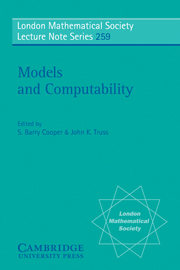Book contents
- Frontmatter
- Contents
- Preface
- Continuous Functionals of Dependent and Transfinite Types
- Degree-Theoretic Aspects of Computably Enumerable Reals
- Simplicity and Independence for Pseudo-Algebraically Closed Fields
- Clockwork or Turing U/universe? - Remarks on Causal Determinism and Computability
- A Techniques Oriented Survey of Bounded Queries
- Relative Categoricity in Abelian Groups
- Computability and Complexity Revisited
- Effective Model Theory: The Number of Models and Their Complexity
- A Survey on Canonical Bases in Simple Theories
- True Approximations and Models of Arithmetic
- On the Topological Stability Conjecture
- A Mahlo-Universe of Effective Domains with Totality
- Logic and Decision Making
- The Sheaf of Locally Definable Scalars over a Ring
- Human Styles of Quantificational Reasoning
- Recursion Theoretic Memories 1954–1978
- Fields Definable in Simple Groups
- A Combinatory Algebra for Sequential Functionals of Finite Type
- Model Theory of Analytic and Smooth Functions
The Sheaf of Locally Definable Scalars over a Ring
Published online by Cambridge University Press: 17 May 2010
- Frontmatter
- Contents
- Preface
- Continuous Functionals of Dependent and Transfinite Types
- Degree-Theoretic Aspects of Computably Enumerable Reals
- Simplicity and Independence for Pseudo-Algebraically Closed Fields
- Clockwork or Turing U/universe? - Remarks on Causal Determinism and Computability
- A Techniques Oriented Survey of Bounded Queries
- Relative Categoricity in Abelian Groups
- Computability and Complexity Revisited
- Effective Model Theory: The Number of Models and Their Complexity
- A Survey on Canonical Bases in Simple Theories
- True Approximations and Models of Arithmetic
- On the Topological Stability Conjecture
- A Mahlo-Universe of Effective Domains with Totality
- Logic and Decision Making
- The Sheaf of Locally Definable Scalars over a Ring
- Human Styles of Quantificational Reasoning
- Recursion Theoretic Memories 1954–1978
- Fields Definable in Simple Groups
- A Combinatory Algebra for Sequential Functionals of Finite Type
- Model Theory of Analytic and Smooth Functions
Summary
Abstract
We introduce some geometric aspects of the model theory of modules and show that for many rings this geometry is rather wild in that it embeds every affine variety.
Two topologies
Let R be any ring and let Mod – R denote the category of right R-modules. To this category is associated a pair of topological spaces which live on a common underlying set. The set is the set of isomorphism classes of indecomposable pure-injective (=algebraically compact) right R-modules. The topologies are the right Ziegler spectrum, ZgR, of R and the right Gabriel-Zariski spectrum, ZarR, of R. Ziegler's topology was introduced in his investigation of the model theory of modules: roughly, its closed subsets correspond to complete theories of modules. The Gabriel-Zariski topology on this set was introduced in as the dual of the Ziegler topology: the compact Ziegler-open sets are taken as a basis of closed sets for the Gabriel-Zariski topology (I will recall the relation to the usual Zariski spectrum of a commutative ring below).
In this paper we describe a sheaf of rings (originally introduced in) over ZarR which generalises the structure sheaf of a commutative noetherianring. The stalks of this sheaf are rings of definable scalars of certain modules and may be regarded as “localisations” of R.
- Type
- Chapter
- Information
- Models and Computability , pp. 339 - 352Publisher: Cambridge University PressPrint publication year: 1999



